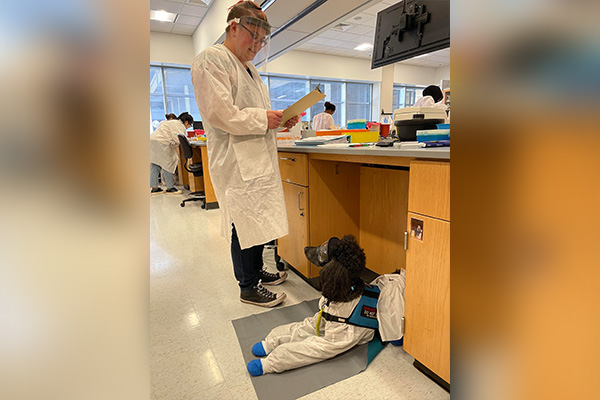MLS faculty give an award-winning welcome, pave new accessibility pathways
July 22, 2024
Erin Wilson

When the Medical Laboratory Sciences faculty first considered the application of a student who had a service dog, the idea of inviting a dog into the lab felt foreign. To their knowledge, there was no precedent for a service dog in a health science teaching lab. Sure, maybe in methodology or in research labs— but what precautions needed to be taken for hematology and microbiology? But by the next faculty meeting, everyone was prepared to make it happen.
As the lab manager, Christine Maleck began researching and compiling resources on safety and procedure for Wesley Flint and his service dog, Nova. As Flint’s lab methods course instructors, Hannah Gartzke and Andy Yue began planning the most ergonomic layout for the pair in the lab space and day-to-day accommodations. Flint, Maleck, and Gartzke all attested to the help of Sohail Akhavein, a former consultant at the University of Minnesota Disability Resource Center who Gartzke said was “an invaluable resource for both faculty and for Wes.”
While Nova already had safety goggles from a former chemistry lab in Flint’s undergraduate years, she would need more comprehensive protective gear for labs where students handled blood, microbiology organisms, and other hazardous fluids. Maleck found fluid-resistant booties and began fashioning a lab coat that would cover Nova from her neck to the end of her tail. Looking up lab coats for dogs online, Maleck found mostly Halloween costumes. But using the costume measurement guide, she sewed the tops of two small lab coats together so Nova’s legs could fit through the four arm sleeves. The coat was secured by snaps along her back and Maleck used a scrap of extra fabric from the coats to sew a sleeve for her tail. A small mat was laid out for her to lay under a desk near Flint. She also wouldn’t be able to leave the lab wearing her gear, so alongside bins for students to leave their personal protective equipment at the end of each lab session, Nova got her own bin.
Using service dog policies from other colleges and universities for reference, Maleck designed a safety plan, needs assessment, behavior expectations, consulting and risk management materials, merchandise for PPE, and a guide for supporting students with service dogs. The only concern from the beginning had been safety, and once Maleck found an example of another service dog in a lab (albeit chemistry, not health sciences), she felt inspired and reassured that it could be done in the MLS program.
Both Maleck and Flint commented on how smoothly the accommodations fell into place; with the amount of planning and forethought and Nova’s patience, the crew ran into next to no issues accommodating her in the lab. In addition to crediting Gartzke and Yue for pioneering Flint’s first lab class, Maleck attributes the success to a faculty-wide effort, as does Gartzke.
“It was a collaborative effort from all MLS faculty that has made having a service dog accommodation possible. All the MLS faculty have been willing to learn and be flexible which has made things run seamlessly,” Gartzke said. “This is also true of our students— they have been respectful too and their willingness and openness cannot go unnoticed.”
At the American Society for Clinical Laboratory Science's (ASCLS) annual meeting in Pittsburgh this month, Maleck accepted the Theriot Award, which recognizes “innovations and materials that contribute to the quality of laboratory testing, improved patient care, or enhance teaching,” for the accommodations the MLS program made for Nova.
Faculty have been reaching out to different labs to help Flint coordinate clinical experience. It may be tough to find a microbiology lab placement because of legal and technical elements, Maleck said, in which case the program would provide Flint with a simulation micro lab.
“Our students work hard to get accepted into the program as it is, so once they're here, we're very invested in our student success. We were going to make this work,” Maleck said. “We're really happy with how smoothly it went and I think the next hurdle is to find clinical experience places that will accept a service dog. Part of that is the education of our clinical affiliates and being able to show how successfully Nova was integrated into our teaching laboratories.”
Maleck said she is also working on a paper, which will include resources to consult and the process she used, for other faculties considering how to make accommodations for service dogs in their own college communities. She anticipates a second paper a year from now in collaboration with Diane Hutchinson, the program’s director of clinical experience, discussing the clinical experience portion of service dog accessibility in labs.
“The fact that we've managed to do it and it went really well, I hope we can use that to educate more people about what the possibilities are and that it can be done,” Maleck said.